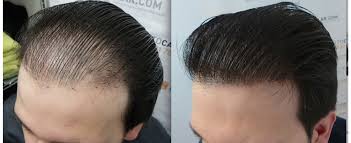Hair transplantation
is a procedure in which hair is used from the back side of the head and
implant in areas where balding has occurred. FUE uses a special
technology that is able to minutely and pain-free take the hair
follicles from the backside of the head and transplant them to hair loss
areas.
FUE involves a controlled pneumatic
pressure to slide out the graft swimmingly, so there is no pulling or
twisting, which can jeopardy damaging the transplant. Because the FUE
transplant is quicker than other superannuated methods, the grafts can
be reimplanted sooner which keeps them richer, increasing the success of
the transplanting method. However, some patients may be the better
person for the FUT or strip hair transplant process. FUT removes and
transplants several hair follicles at once for a shorter method.
While performing FUE surgery, the machine
grafts a few hair follicles. These will then be implanted into the area
of hair loss. A session for Best Hair Transplant in Delhi
can last up to 3 hours. After the process, the patient’s head will be
thoroughly rinsed off and a protective cream will be applied to the
scalp. Strict instructions about taking care of the grafts will be
provided.
It is general to feel a bit pain and
tenderness for the first few days following the procedure. The patient
must refrain from physical activities to avoid additional swelling of
the forehead. Make sure that no pressure is put on or around the grafted
area to avoid complications.
FUE or follicular unit extraction is the
advanced technology used for permanent hair transplant surgery. It has
taken plenty of years for hair transplant surgery to reach an acceptable
level where outcomes are typically natural and the method is minimally
invasive. Each follicle is taken from the donor area INDIVIDUALLY, and
then each hair is placed into the tiny incisions that are made in the
recipient area individually.
As follicles are grafted individually, there is no cutting or surgical scarring involved and patients make a very fast recovery.
FUE is not only used for male pattern
hair loss, it has become greatly popular in eyebrow restoration as well
as beard reconstruction.

No comments:
Post a Comment